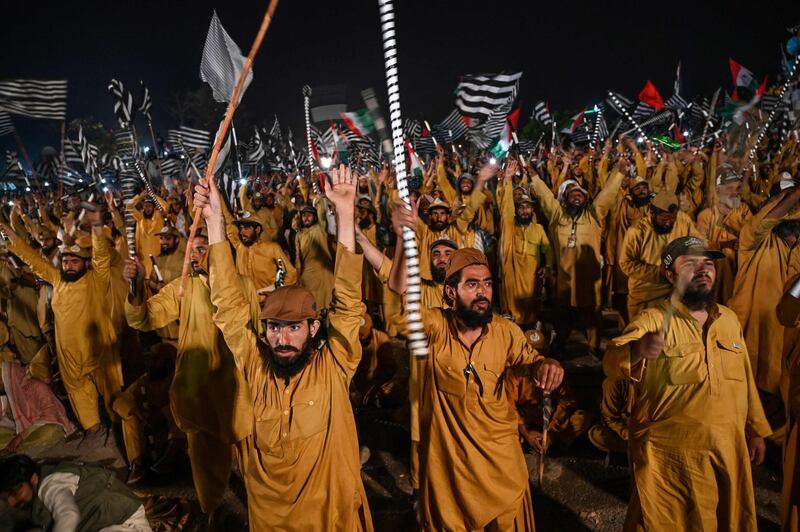Tens of thousands of members of a hardline Islamist party set up camp in Pakistan's capital on Friday to demand the resignation of Prime Minister Imran Khan over economic hardships
Maulana Fazlur Rehman, the leader of the Jamiat Ulema-e-Islam party, and his supporters entered Islamabad at about midnight Thursday after setting out on their "Azadi March" from the southern city of Karachi last Sunday.
Chanting slogans for change and waving party flags, they camped out at an open area allocated for them by the government amid tight security.
Mr Rehman has accused the military of influencing the 2018 parliamentary elections that brought Mr Khan's Pakistan's Tehreek-e-Insaf party to power. Mr Rehman's seven-party political alliance, Muttahida Majlis-e-Amal, could secure only 16 seats in the 342-member National Assembly, the lower house of parliament. Mr Khan won 155.
Mr Khan on Friday told a gathering in the northern city of Gilgit that he was not afraid of Mr Rehman's threats to his government. He said opposition parties under the leadership of Mr Rehman had entered Islamabad with their supporters to call for accountability.
"I will continue to hold the corrupt accountable," he said.
Authorities have deployed police and paramilitary forces and put shipping containers on key roads in the capital to prevent the massive anti-government procession from reaching the Red Zone, where government offices, parliament and foreign embassies are located.
The rally comes two days after Pakistani businesses observed a nationwide strike against recently imposed taxes, which the opposition says were imposed as part of the International Monetary Fund's $6 billion bailout package for Pakistan.
Mr Khan insists he is taking measures to improve the economy. But his political opponents want immediate fresh elections, saying his government is creating more problems for the life of the common man.
Mr Rehman, in a fiery speech to demonstrators Friday night, vowed to continue his protest until the prime minister stepped down. He said Mr Khan was the most incompetent ruler in the country's political history and that his ouster was necessary for saving Pakistan and saving people from more hardship.
He said his rally was peaceful, but claimed his supporters had the capability to remove Mr Khan from power by entering his official residence. He also asked the country's military to remain neutral because "we don't want any confrontation with the institutions".
Mr Rehman, without naming the army, said he wanted the country's "powerful forces to end their support for Mr Khan's government "in the next two days".
Almost all of Pakistan's main political parties have extended their symbolic support of Mr Rehman's rally by joining him in anti-government speeches.
Bilawal Bhutto Zardari, leader of the Pakistan People's Party, told one of the largest rallies in Islamabad's recent history that they would wage a joint political struggle to force Mr Khan to resign. He called Mr Khan a "puppet ruler".
Shahbaqz Sharif, who heads the Pakistan Muslim League party, promised in a speech to improve the country's economy within six months if his party came to power after the removal of Mr Khan's government.
Pakistan's opposition says Mr Khan won the election because of the support of "unseen forces" – a reference to the country's powerful military, which has denied supporting any political party in the 2018 parliamentary elections.






